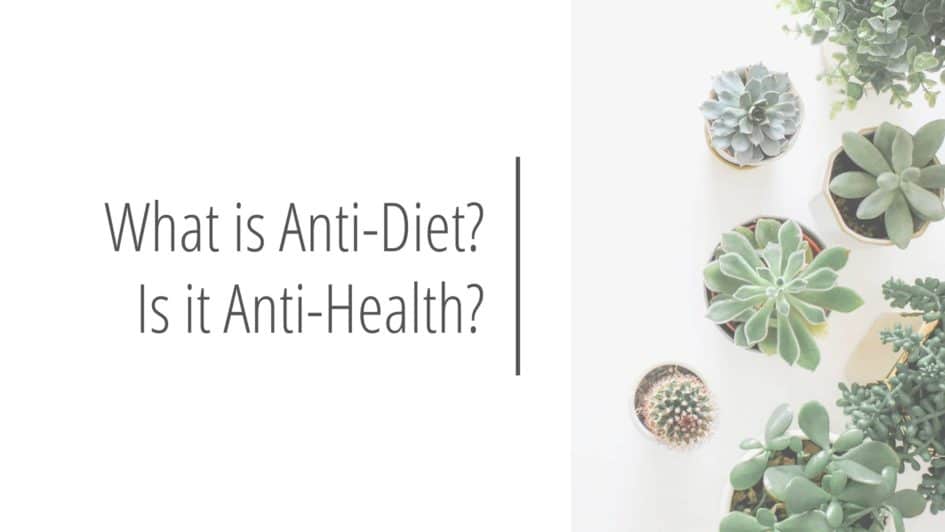Table of Contents
What is Anti-Diet?
The anti-diet movement strives to fight against the beliefs and viewpoints of diet culture.
In a nutshell, diet culture sets a standard of beauty that it thinks society should conform to. This standard is ever-changing but always emphasizes a thin, skinny body.
If someone’s body does not conform to these standards, diet culture encourages weight loss via dieting, disordered eating habits, excessive exercising, and overall restrictive, unhealthful habits.
Diet culture preaches achieving the ideal body by whatever means necessary. It encourages obsessive, harmful habits while simultaneously demoralizing those in its path. Diet culture breeds eating disorders, body image problems, and poor mental health.
To be anti-diet means to be in a support of the anti-diet movement. It’s not just about being against diets or discouraging fad diets. It means going after and taking down diet culture. This involves breaking down barriers with body image, weight bias/discrimination, fatphobia, eating disorders, exercise, nutrition, Health at Every Size (HAES), Intuitive Eating, and so much more.
If you want to read a little more about diet culture and why it’s important to fight it, read my post, Toxic Diet Culture – 8 Reasons Why It’s Harmful.
What’s an Anti Diet Dietitian?
An anti-diet dietitian is a registered dietitian (RD) that specifically takes the anti-diet stance. Anti-diet dietitians focus on dismantling diet culture while also helping others pursue true health. This involves the promotion of Health at Every Size, Intuitive Eating, body image work, eating disorder recovery, and more.
Is Anti-Diet, Anti-Health?
When talking about what is anti-diet, a common thought is that anti-diet means anti-health. There are misconceptions that the anti-diet movement promotes laziness, discourages healthful eating, or even hates thin-bodied people. However, if you break down what anti-diet does and does not stand for, it’s easy to see that anti-diet is actually pro-health.
What Anti-Diet Stands For
- Supports the Health at Every Size (HAES) approach
- Encourages Intuitive Eating (IE)
- Encourages enjoyable physical activity
- Discourages restrictive, harmful habits
- Encourages a healthy relationship with food
- Encourages a healthy relationship with your body
- Supports and advocates for mental health
- Supports others through their battle with food and body
- Discourages weight stigma
- Supports equality in health care
- Supports a weight-inclusive approach to health
- Discourages pursuing intentional weight loss
- Blames society for creating a toxic culture around food and body
- Aims to rid our society of fatphobia
- Attempts to solve societal issues rooted in food and body
- Promotes self-care and self-love
- Blames the culture, not the individual
- Supports the body positivity movement
- Meets people where they are at, in order to have the greatest impact on them
- Discourages placing value on weight
- Encourages placing value on how you feel
What Anti-Diet Does Not Stand For
The anti-diet movement does not…
- Encourage laziness or lack of physical activity
- Encourage over-indulgence or gluttonous activities
- Discourage eating healthy foods or striving for an overall healthy, balanced diet
- Act as a scapegoat for living healthy or an excuse for being lazy
- Discriminate against any bodies, including people with thin bodies
- Blame those who have thin privilege
- Shame those who pursue weight loss
- Blame the individual, but it blames the culture instead
- Preach that you can no longer say no to certain foods
Quick Summary
I label myself as an anti-diet dietitian. This means that I strive to take down diet culture while simultaneously helping others free themselves from disordered eating habits and body image issues. This means that I promote Intuitive Eating and Health at Every Size (HAES) while fighting wellness culture and weight discrimination.
A simple way of looking at it is that I take care of my body by eating nourishing foods (for both body and mind) and participating in enjoyable physical activity. It means that when I need a break from exercise, I take the time off that I need and don’t push myself. It means that I enjoy my favorite foods and beverages without labeling them as good or bad. I choose to not base my health status on my weight but on how I feel and what my body is capable of.
By doing this, I help remove the stigma that health looks a certain way. Through these health approaches, I am able to pursue health and fully enjoy a life free from restrictive, damaging habits.
Next time you hear the term anti-diet, remember that it doesn’t mean anti-health. It means figuring out how to navigate the complex concept of health in a way that involves non-restrictive habits, self-compassion, freedom, and learning how to truly care for yourself.
Remember, anti-diet dietitians truly want to help you pursue health, not the opposite.
If you’re looking for ways to dismantle diet culture, check out my anti-diet themed store full of fun products!
Thanks for reading!
Rachel Beiler, MHS, RD, LDN


Leave a Reply